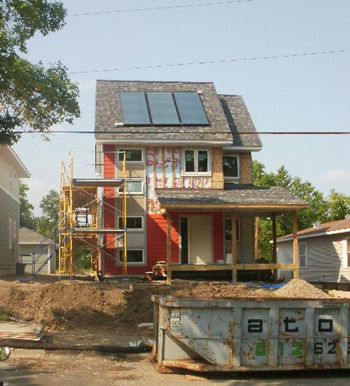Issue Media Group publications across the country cover "what's next" for urban centers. In this recurring feature, we highlight the top stories in urban innovation from all across our national network.
Detroit's wind economy
A local petting farm in metro Detroit generates 40 percent of its power from wind and solar, while in the thumb of Michigan, wind farms are sprouting up on farmland. These are just a few of the projects powering up metro Detroit's -- and Michigan's -- growing wind economy.
"Building a wind turbine in Metro Detroit is a lot easier said than done," finds Jon Zemke of
Metromode. "It's such a challenging proposition that it flips local conventional wisdom on its head. Blue-collar suburbs in Detroit's Downriver are integrating big alternative-energy projects into their everyday lives while college towns succumb to build-nothing-new NIMBYism."
Pittsburgh's smart moves
Newly-elected Mayor Bill Peduto says Pittsburgh is on the cusp of a new era -- one that builds upon the past and emerged from three decades of cross-sector leadership, a willingness to change and the development of amenities that residents want.
“In my view, Pittsburgh is going through its fourth transformation,” he tells
Pop City, referring to its Colonial history, rise as a Steel town, economic collapse and now resurgence. “The next 10 years will determine where we’ll go in the next 50 ... whether [we'll] be the example of how a post-industrial city can survive or the model of a 21
stcentury city. We’re going for the latter.”
 Memphis' startup symphony
Memphis' startup symphony
What happens to a city's symphony when its endowment dries up and it confronts mortality?
"Memphis certainly isn't the first city to see its symphony struggle in the wake of the 2008 market crash," reports John Minervini in
High Ground. "Orchestras in
Philadelphia and
Albuquerque filed for bankruptcy. In
San Jose, the symphony stopped playing and never resumed. But [leaders] say they aren’t willing to accept a fate like that for Memphis."
"In order to keep the music playing, [it] will have to do something that few orchestras have ever done ... make the symphony sustain itself from year to year without the benefit of an endowment. In other words, they need a new business model. Behold the startup symphony."
Cincy's food truck feast
Cincinnati is seeing an explosion in food trucks, which are not only a tasty way to serve grub, but also encourage street life, give entrepreneurs a start and act as business incubators. "People are gobbling them up," writes Caitlin Koenig in
Soapbox, who recently caught up with the owners of 30 tasty food trucks to learn what they’re known for and how to find them.

Habitat for Humanity NetZero house. Photo by Dan Handeen.
Unexpected solar cities
"Solar power isn’t just for southern locales anymore," writes Camille LeFevre in
The Line. In fact, she finds in this insightful feature, "Minnesota actually has the same or better 'solar resources than most of the southeastern and northeastern U.S., 'with more ‘peak sun hours’ here (on an annual basis, 4.6 hours daily average) than Germany, the top solar market in the world.'"
Canada's Silicon Valley
Everyone is trying to create the next Silicon Valley, a job that's deemed difficult and perhaps impossible in this recent article in
The Atlantic. Yet that won't stop Toronto from trying. The dream is taking shape via the Ontario Network of Entrepreneurs, an initiative that aims to support and advance innovation-based entrepreneurship in Ontario, reports
Yonge Street.
 Connectivity matters
Connectivity matters
Two very different cities, Denver and Cleveland, are working on efforts to better connect urban neighborhoods via transportation. In Denver, this is taking the shape of a new comprehensive
plan for downtrodden Globeville, which might just become the city's next desireable 'hood. In Cleveland,
alt transportation is taking root, from pedicabs to ridesharing.
Immigrant entrepreneurs"Throwing yourself into a startup business in the life sciences field would seem like a daunting enough task for most people: You’ve got product design challenges, corporate structure complexities and IP headaches to deal with, not to mention the tightrope-walk of securing funding for your venture," writes Steven Thomas Kent in
Rapid Growth.
"But add in immigration and visa obstacles to that recipe and it seems like an explosive cocktail — almost too much uncertainty to bear. You’d be forgiven if you thought about just throwing in the towel."
This compelling piece tells the story of Dr. Stanley Samuel, a life sciences entrepreneur who risked everything to launch a startup because of his avowed "passion" for entrepreneurship.